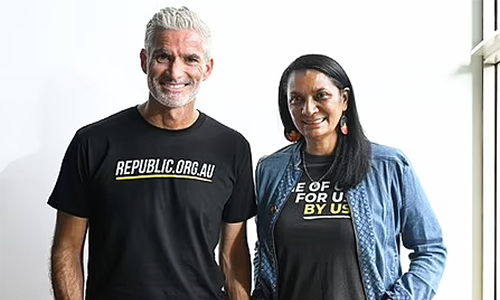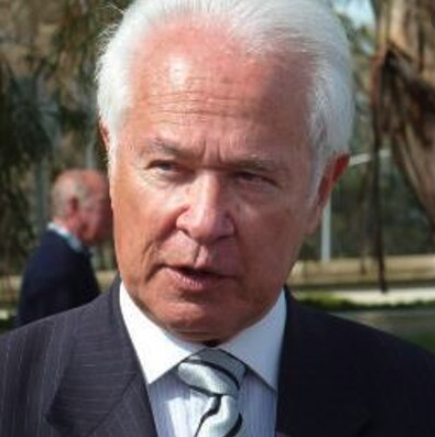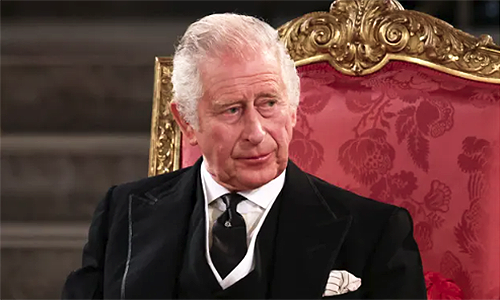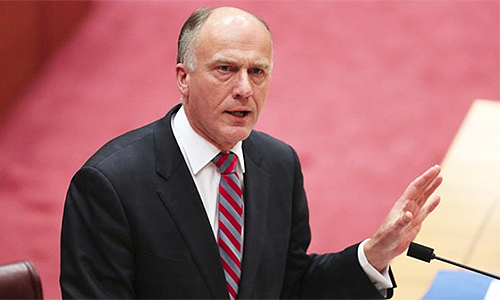
by DAVID FLINT – THE Australian Republican Movement is in turmoil with its leaders, Craig Foster and Nova Peris both resigning.
Outraged by Foster’s calls for Israel to be removed from international football competitions over the war initiated barbarously by Hamas terrorists, Ms Peris’s objection was principled.
- But they’ve never put it on. Why?
- They fear that the landslide defeat inflicted on them in 1999 will be repeated.
- Many believe Australia is already a republic, a crowned republic.
Foster’s reason for resigning was truly curious. It was that he was going to resign anyway. With ten leaders so far, the ARM does change its leadership often. Frankly, in fact, it doesn’t really matter who runs the ARM. As Bill Hayden said of another office, it could be filled by a “drover’s dog”.
On the other hand, it is absolutely crucial who runs the constitutionalist monarchist campaign. This is because the ARM can go on for ages talking about referendums, with people ready to waste money on them apparently easy to find.
FOLLY
If they lose a referendum, they can always come back and try again, provided there are politicians willing to waste taxpayers’ funds on this folly.
But Australians for Constitutional Monarchy (ACM) know that in a referendum, they will most likely have only one chance. If they lose, that’s the end. With a republic in place, few politicians would support a referendum for a restoration.
Had ACM lost the 1999 vote, when it was eventually realised that the politicians’ republic suffered from several deficiencies, the debate would then have been about how best to fix it.
Incidentally, that was what Kim Beazley offered. Calling for votes for the Keating-Turnbull model, he suggested any defects could be fixed up later.
The extraordinary thing is that the nation went through not just the 90s deciding on whether to install what ACM famously called a “politicians’ republic”.
The battle went on for well over three decades and it wasn’t just revenge for Gough Whitlam’s dismissal, it was to make sure it never happened again.
If anyone doubts Whitlam was behaving unconstitutionally in 1975, they should recall that on several occasions as opposition leader, he stated the constitutional proposition that if the government were defeated on a money bill in the Senate, including a denial of supply, the government must resign.
Indeed, in August 1970, when Labor launched its 170th attempt since 1950 to bring down the government, Mr Whitlam had Attorney-General Lionel Murphy table a list of the previous 169 attempts.
Sir John Kerr’s action was fully in accordance with the constitution. As to the 1999 campaign, the monarchist side was run by one organisation, ACM. With 29 of the 37 monarchist delegates at the convention, ACM dwarfed the other four or five groups.
And by the referendum, ACM had around 60,000 foot soldiers in the field, far more than the republicans.
NO EXPERIENCE
ACM soon found that its considered strategy was different than that suggested by some monarchist groups with little or no experience in political campaigning.
Unlike some groups, both monarchist and republican, where decisions are made by a single leader, ACM had a more cabinet-style leadership, including some of the best political strategists in the country.
ACM concentrated on the faults in the model compared with the status quo.
While ACM had no reservations in honouring the Queen (including the playing of the Australian Royal Anthem when she was present), they argued, on sound legal grounds, that we already had an Australian as Head of State.
ACM was also not interested in pointlessly irritating some judge by trying to delay the referendum on the “ticks and crosses” issue.
Nor did ACM distinguish between “good” and “bad” plebiscites. Rather, ACM was and is totally opposed to plebiscites where a referendum is prescribed.
In addition, many in ACM believe Australia is already a republic, a crowned republic.
Moreover, ACM had both indigenous and Labor involvement in the leadership.
As monarchists across the country would overwhelmingly vote No, ACM concluded there was no point in campaigning for their vote.
OUWITTED
Rather, ACM campaigned for the “Bill Haydens” of the world, neither monarchists nor republicans, who believed that what we have is vastly superior to the alternatives.
Most importantly, ACM had to make up for the vast wealth and influence enjoyed by the republicans, especially by strategies which outwitted them.
As the campaign progressed, and the government appointed the Yes and No committees to handle campaign funds of $7.5m each, the members were chosen on the basis of votes received in the convention election.
Accordingly, eight of the ten seats went to ACM and two to the Real Republicans.
Unfortunately, only one Real Republican had a true campaign organisation. He was Clem Jones, the former ALP Lord Mayor of Brisbane. This meant that in other States, the Real Republicans might not be heard.
That was where cooperation did not go astray, nor did political advice.
The relationship both in the No committee and outside was proper and professional.
As the late Emeritus Professor Martyn Webb wrote in Andrew Murray’s Trusting The People: An Elected President For An Australian Republic (2001), ACM leaders “impressed us by their grasp of the political realities and the vital importance of attacking the proposed law” containing the republican model.
And we knew, of course, that in some future campaign, we could be on different sides.
It is likely that in any future campaign, there will always be republicans who dislike the model on offer and will vote No.
As for the future, the ARM and their masters in the ALP have spent a quarter of a century talking about a second referendum and telling us how it will be successful. But they’ve never put it on. Why?
No doubt because they fear that the landslide defeat that ACM inflicted on them will be repeated.
It is probable now that Australia, for at least this century, will live under the reigns of Charles III, William V and George VII with a second referendum most unlikely.PC













Australia should have an Australian as head of state.
Because Australia is not a gutless little colonial outpost.
Good argument, yes?
A foreign monarch reigning over Australia is an insult.
But worse – much worse – are the pitiful cowards which think it is all we deserve.
Mr Jones, You are probably wrong. But, even if you are not, you will not gain my support. In my world, the best argument wins. You appear incapable of mounting anything other than mindless abuse.